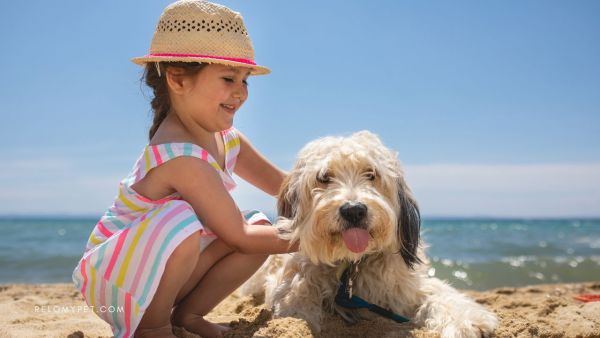WHAT DOCUMENTS DO YOU NEED TO BRING YOUR PET TO GREECE?
Regulations are different for EU and non-EU countries. If you are coming to Greece from another European country, your dog will need a microchip to be identifiable, an anti-rabies vaccination, a veterinary certificate of good health and a passport. Contact your veterinarian as soon as possible to ask about the right path to follow and the timescales with which it is necessary to prepare the documents.
PLANE OR FERRY?
Among the airlines that currently connect Italy and Kefalonia with direct flights, Ita Airways, Neos, Volotea and Aegean allow cats, ferrets, rabbits, hamsters and small dogs on board, which are transported in the cabin in a carrier (we invite you to check directly on the website of the specific companies, costs and methods). For many it is easier to organize their trip by ferry, transporting their animals in special boxes on deck and giving them the opportunity to use the common external areas, although obviously never free and always accompanied. Pets can also travel in the cabin, if available, enjoying the company of their family with greater peace of mind. We have always chosen Super Fast ferry and a cabin for our trips.
IS IT EASY TO FIND A PET-FRIENDLY ACCOMMODATION IN KEFALONIA?
There are numerous accommodations that will welcome your animal friends with open arms. While residences with many rooms and in very touristy locations tend not to welcome animals to avoid possible annoyance to other guests, structures with few apartments and even more independent houses with gardens are pet-friendly and will offer you and your animals all the comforts you need.
CAN I BRING MY DOG TO THE BEACH?
According to Greek law, pets are allowed on the beach but always on a leash, both on free and equipped beaches, and the owner must have the pet’s health booklet which shows that the animal is vaccinated and chipped. Keeping your dog on a leash is essential to protect not only any people on the beach intimidated by animals but also your animal from potential dangerous contacts (for example with stray cats) and finally to safeguard possible turtle nests often threatened by animals that break the eggs when digging. Obviously you need to collect your pet's excrement and consider that summer temperatures in Greece may be extreme, so it is essential to always have shade and fresh water to protect it from heat strokes. In the case of beaches organized with umbrellas and beach bars, it is up to the business that manages the beach to decide whether or not to allow pets in the areas under its jurisdiction (not on the beach in general). Animals are not allowed to enter the water in the presence of other swimmers, while swimming is allowed on free beaches as long as there are no people there. Before swimming, it is therefore advisable to ask any other people for their approval to avoid running into problems and fines.
CAN I BRING MY PET TO A RESTAURANT OR PUB?
Absolutely yes, with the delicacy of asking the staff where to sit to guarantee the dog, dining room staff and other customers the right freedom of movement. Don't forget that in almost every tavern there are cats wandering freely among the tables: be careful if you are traveling with a cat or a dog who could be annoyed by their presence. If you want to reward or refresh your dog with an ice cream for dogs we recommend I-scream in Argostoli and Lixouri.
CAN MY DOG ACCOMPANY ME ON AN EXCURSION?
Of course, whether it's trekking or a boat trip. Don't forget to report the presence of your pet to the staff at the time of booking and make sure to bring water and food with you and always find a quiet, shaded place for it to rest.
WHO SHOULD I CONTACT FOR A MEDICAL EMERGENCY?
There are numerous veterinarians on the island and some of them, in addition to English, also speak Italian. You can contact their clinics if your animal needs immediate medical attention but also if you find yourself rescuing a stray that needs help.
ARE THERE MANY STRAYS IN KEFALONIA?
Traveling through the villages of the island you will see many stray cats and some dogs free to roam without a collar or leash. It is advisable to drive at reduced speed within residential areas and to pay greater attention near rubbish bins to avoid injuring or killing animals. The presence of so many animals on the streets is unfortunately dictated by a limited number of sterilizations but also by a different conception of domestic animals and their management. Therefore, dogs and cats walking around are not necessarily abandoned, they often leave their owners' property to return at will. Some associations and numerous volunteers provide excellent support to stray animals throughout the year and throughout the island with sterilization, feeding and adoption programs. Municipalities also contribute to the well-being of their animals by providing, for example, water and food to dogs and cats that live in the main squares and streets of the cities. You can contribute with donations if you wish, every support is important!
Sources:
https://www.animalactiongreece.org/advice-and-welfare/greek-legislation/
https://www.superfast.com/en-gb/generic-information-pages/pets-on-board
https://feelslikehome.gr/blog/greek-law-about-pets-beach/#:~:text=The%20most%20important%20thing%20you,they%20are%20on%20a%20beach.

